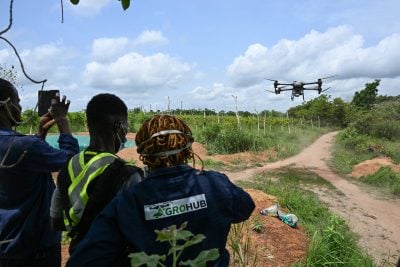There can be no argument that the mobile banking revolution is the biggest current trend in the African banking industry. As discussed above, the developers of some payment cards hope that their systems can provide financial services to previously unbanked Africans.
Yet by extending the use of airtime accounts, millions of people are now saving money for the first time and many others are paying bills and transferring money to family in distant places without the cost of going through a traditional bank.
While just a fifth of Africans have formal bank accounts, the proportion of the population with a mobile phone is now approaching 50% and looks set to continue rising for the foreseeable future, particularly in rural areas.
Most studies find that urban residents are more likely to use every kind of mobile banking service than their rural counterparts, with the exception of transferring airtime between users. It seems that it is not just in Kenya that airtime is being used as a form of currency and is helping to bring banking to the masses.
The most common uses of mobile technology are balance enquiries, paying bills, buying mobile airtime, transferring money between accounts and buying products. Companies investing in mobile banking technology are keen to point out the social and developmental benefits of their schemes.
Importance of mobile banking
Yolande van Wyk, the chief executive of First National Bank Smart Services in South Africa, said: “Products like the FNB eWallet are allowing us to bridge the gap between the banked and the unbanked and address the real need of access to financial services. This also allows for the transfer of cash and airtime to be done safely and easily.”
The Central Bank of Nigeria (CBN) had been reluctant to licence mobile banking services until they were confident that the new sector could be properly regulated. However, last December the central bank finally granted a provisional operating licence to British firm Monitise and its Nigerian partners. Monitise, which already operates in many other markets, including the UK and the US, launched its mobile payments services in three states as a pilot service in March this year.
It is initially working with Afribank, which takes cash deposits for the mobile accounts, and allows customers to access their accounts on a mobile internet browser.
Mobile operator Etisalat is also supporting the venture by providing access via its call centre and dealer network, although customers can use Monitise from any mobile network. The venture has received a $1.5m grant from the Africa Enterprise Challenge Fund (AECF) to help fund its launch.
Just 19m out of Nigeria’s estimated population of 150m have a formal bank account but at least 75m have mobile phones, suggesting that mobile banking could easily take off in the country.
Lee Cameron, the chief commercial officer of Monitise, said: “In conjunction with our local partners, we are delighted to be able to offer Monitise’s technology in this environment, empowering the millions of Nigerians who cannot access, or simply do not have, a conventional bank account to enjoy the benefits of inclusion within the financial world. We are committed to bringing the latest developments in mobile money management and payments to the unbanked across not just Africa but India and Southeast Asia as well.”
Importance of mobile banking
Mobile banking has also been launched in Zimbabwe by Telecel, which is offering all of the usual services, including paying bills and transferring airtime. A spokesperson for the company said: “With this service your bank is your phone. It goes with you wherever you go. There will be no need for people in rural areas to travel to the city or growth point to withdraw money. Once they have received an SMS confirmation that money has been deposited into their virtual account, they can visit the nearest farmer, supermarket, post office or non-governmental organisation that is in partnership with Telecel to collect their cash.”
Just as mobile phone usage is a more important component of the phone sector as a whole in developing countries than in the industrialised world, it seems likely that mobile banking will soon become a more important element in the banking industry in sub-Saharan Africa than in the industrialised West. The specific characteristics of African markets mean that the continent can give rise to banking solutions as well as problems.
Once a greater proportion of the African population gains access to a reasonable income, it will be interesting to see what other banking solutions the continent can give the world.
Want to continue reading? Subscribe today.
You've read all your free articles for this month! Subscribe now to enjoy full access to our content.
Digital Monthly
£8.00 / month
Receive full unlimited access to our articles, opinions, podcasts and more.
Digital Yearly
£70.00 / year
Our best value offer - save £26 and gain access to all of our digital content for an entire year!

 Sign in with Google
Sign in with Google 




